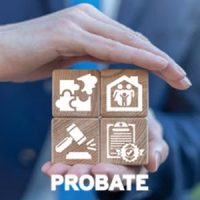How Connecticut Deals With “Small Estates”

Many people are worried about the potential time and expense of probating a deceased loved one’s estate. In many cases, however, the probate process can be quite simple. In fact, there is even a specific procedure under Connecticut law to manage “small estates” without the need for all of the formalities of traditional probate.
First, what do we mean by a “small estate”? Connecticut law defines it as a probate estate where the decedent’s tangible and intangible personal property does not exceed $40,000. “Tangible” property refers to physical items, such as a car or furniture; while “intangible” property includes non-physical assets like bank accounts.
No Real Property
Notice the small estate definition does not include “real property” such as land or other real estates. That is because the small estate process does not apply when the decedent owned real estate property. If the decedent only co-owned real property with someone else– like spouses who held their home as joint tenants with rights of survivorship–then the small estate process may still be used.
An Affidavit-Based Process
So, what happens when you have a small estate? Basically, the decedent’s surviving spouse or next of kin files particular forms including an affidavit with the probate court seeking authorization to distribute the decedent’s assets. The affidavit needs to contain certain basic information, such as a list of the decedent’s probate assets, the contact information of heirs or beneficiaries, any debts or claims against the estate, and whether or not the deceased received Medicaid benefits.
Typically, the surviving spouse or next of kin files the affidavit, however, any other “interested person” file the affidavit. This can include a creditor of the decedent who simply wants to get paid. Even in the probate of a small estate, the probate court will ensure creditors get paid if there are any funds available in the estate. Typically, the payment or reimbursement of funeral expenses takes top priority. The court can also provide an allowance for the decedent’s surviving spouse or family out of the small estate’s assets.
Even if the decedent left no will, a small estate may be probated by affidavit. If the decedent died intestate (meaning died without a will), anything left in the estate is distributed under Connecticut’s intestate succession law.
If there is a will and it directs a distribution that differs from the intestate succession law, in certain circumstances, it may be necessary to dismiss the small affidavit petition and conduct a regular probate proceeding.
Overall, however, small probate typically takes just a few weeks to complete. The law only imposes a 30-day waiting period before the court can approve the final distribution of a small estate. In regular probate, this process usually takes at least 9 months or more.
Contact Connecticut Probate Lawyer Brian S. Karpe Today
No matter the size of an estate, the probate process can be quite difficult for families still struggling with the loss of a loved one. That is why it is always a good idea to work with an experienced Canton probate attorney. Contact the Law Office of Brian S. Karpe, LLC, today to schedule a free case evaluation.
